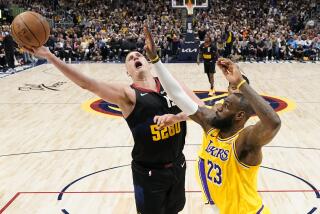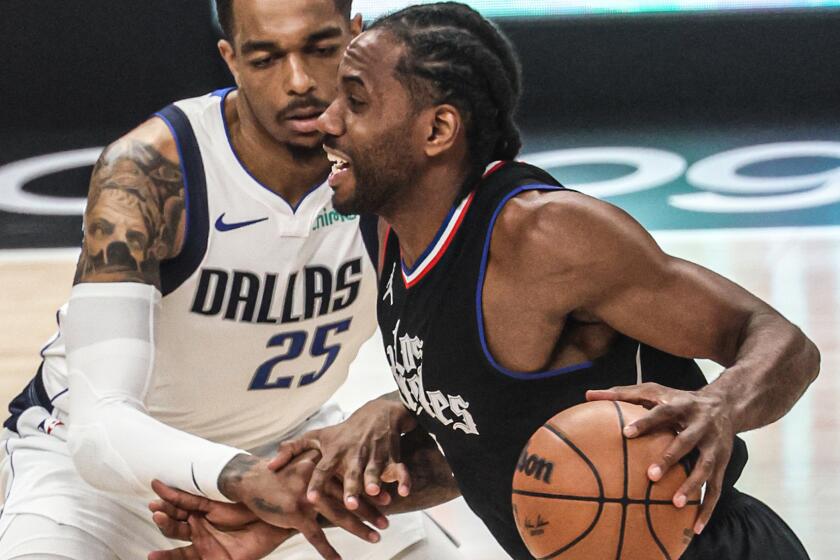Is it safe to root again?
It’s the allegory, stupid.
It’s a brand-new ballgame, sports fans, and I’m not sure how to watch it.
In this opening season of the post-steroid era, I feel like a betrayed spouse determined to make the relationship work, struggling to balance experience against hope. Are my guys really clean now? If not, can I live with it?
FOR THE RECORD:
Baseball: An April 4 op-ed article about the coming baseball season said fantasy leagues were invented in 1980 and relied on USA Today box scores. USA Today was not started until 1982. In the early years, fantasy leagues used other sources for statistics. —
And I can’t shake the feeling that baseball isn’t baseball anymore; it’s just another fading allegory for everything else.
In 1954, deep into the Cold War, a leading historian of our national character, the French-born Jacques Barzun, famously declared, “Whoever wants to know the heart and mind of America had better learn baseball.”
Give baseball its due: No sport has ever enthralled so many intellectuals. Right into this century, media gasbags were still calling it “the national pastime” (long after football, by most measurements, had captured that title) and using baseball terminology to touch base with the man in the bleachers.
So now what? For more than a dozen years at least, major leaguers have been using steroids and other helpful drugs and thrilling us with the results. Now, suddenly, we are supposed to be angry at them and maybe slightly ashamed of our complicity as well. This season, the players have been declared clean, and we are supposed to forgive them for cheating on us and forgive ourselves for cheering for them.
Can we do it? Should we? What are our options?
Consider these three: We can relocate emotionally to an alternative sports universe. We can put our faith in the idea that baseball is too big to fail, and soldier ahead. Or we can man up, dig in and try to make some systemic changes.
The alternative universe option, also known as fantasy leagues, has been around for a long time, and its present form was created in 1980, when a group of clever Manhattanites led by magazine editor Daniel Okrent shuffled and dealt existing major league rosters to create their own teams. They used USA Today box scores to chart winners and losers in their Rotisserie League.
Today’s version is a multibillion-dollar business that includes many other sports, countries, computer programs and gambling systems, but the sensibility remains the same: It’s better to be the boss than the worker. And by rooting for real players scattered among real teams rather than for the real teams themselves, this option allows us, as fantasy team owners, to root for ourselves. Talk about American individualism and exceptionalism!
The second option this season is to simply reembrace the game and ignore the past, which might be considered a different kind of fantasy baseball. It’s not as if this approach would turn us into ‘roid deniers; it’s just that there’s no upside to wallowing. Let’s celebrate! Drugs are gone! We’re clean (again)! The nation and its pastime are back and ready to win -- like the defending champion Yankees!
Of course, there will still be debatable issues. Think of it as the math of the aftermath. Statistics are crucial to baseball. So how do we deal with records that were set under the influence? Should there be scarlet asterisks next to the names of steroidal batters, marking their unfair advantages to the end of American time? And if so, then how do you deal, statistically speaking, with the fact that they were facing steroidal pitchers?
The third option, of course, is meaningful change.
Drug use was always the symptom, never the disease, never the cause. The decay actually started with greedy owners getting taxpayers to build them stadiums with luxury boxes that keep the haves from having to rub shoulders with the have-nots. (Is it any wonder that the poor schnooks who can no longer afford ballpark beer are throwing themselves into “tea parties”?) Why can’t cities own nonprofit clubs run by fans and players? There would be caps on ticket prices as well as salaries.
More meaningful change? Let’s talk immigration reform. Immigrants, arriving from America’s baseball colonies -- the Dominican Republic, Japan, Cuba, South Korea -- have become crucial to the game. But how are they getting here? Like the day laborers waiting to be plucked off suburban street corners in the U.S., teenagers in the Dominican Republic line up at major-league-run “academies” where they are schooled and tested in hitting, fielding and throwing. Most will be discarded. The best will be represented by buscones, agents who have become known for grabbing big chunks of signing bonuses and doctoring papers to make their prospects seem younger. It’s time to begin to police this exploitation of the kids.
Finally, let’s talk drugs, which have been blamed on rogue players while the tacit encouragement of management has been ignored. It’s time to start fining owners and stripping teams of their victories for drug use.
Which option will I take?
I won’t join a fantasy league. No way do I want to identify with a McCourt or a Steinbrenner. And hoping for a baseball “revolution” has too much potential for heartbreak. So, for me, there’s no choice really. I’ll just cross my fingers and root for my team, hoping that I won’t be jilted, betrayed and played for a rube yet again.
Robert Lipsyte, the Jock Culture correspondent for Tomdispatch, is the author of a new young adult novel about baseball, “Center Field.”
More to Read
Get our high school sports newsletter
Prep Rally is devoted to the SoCal high school sports experience, bringing you scores, stories and a behind-the-scenes look at what makes prep sports so popular.
You may occasionally receive promotional content from the Los Angeles Times.






